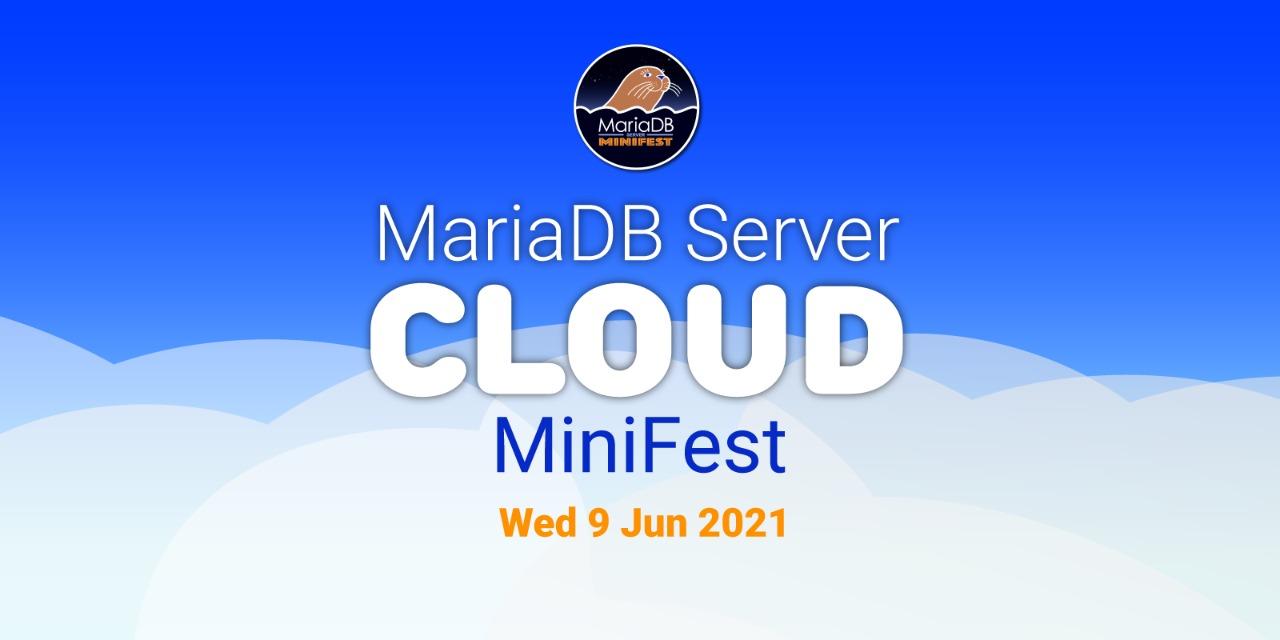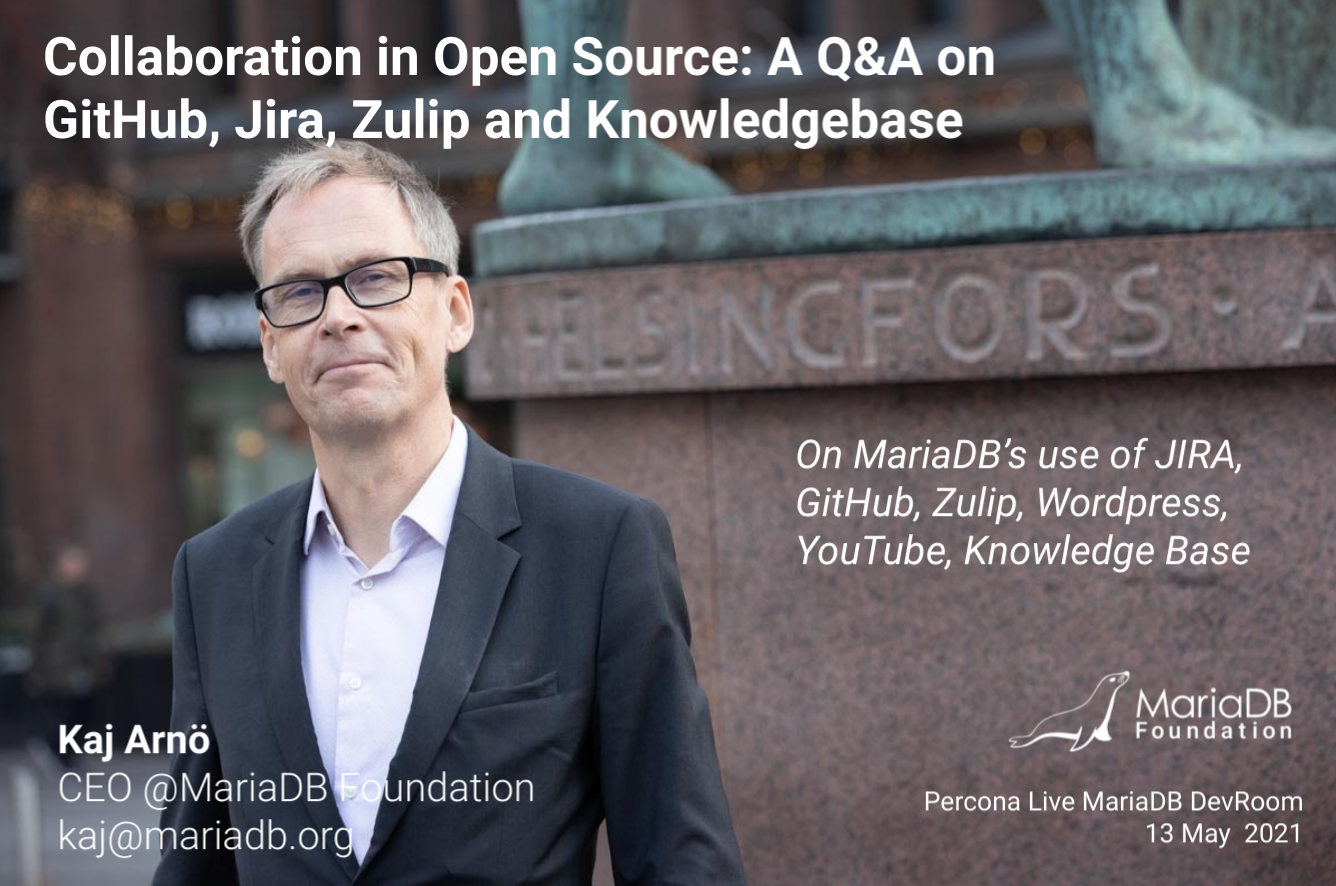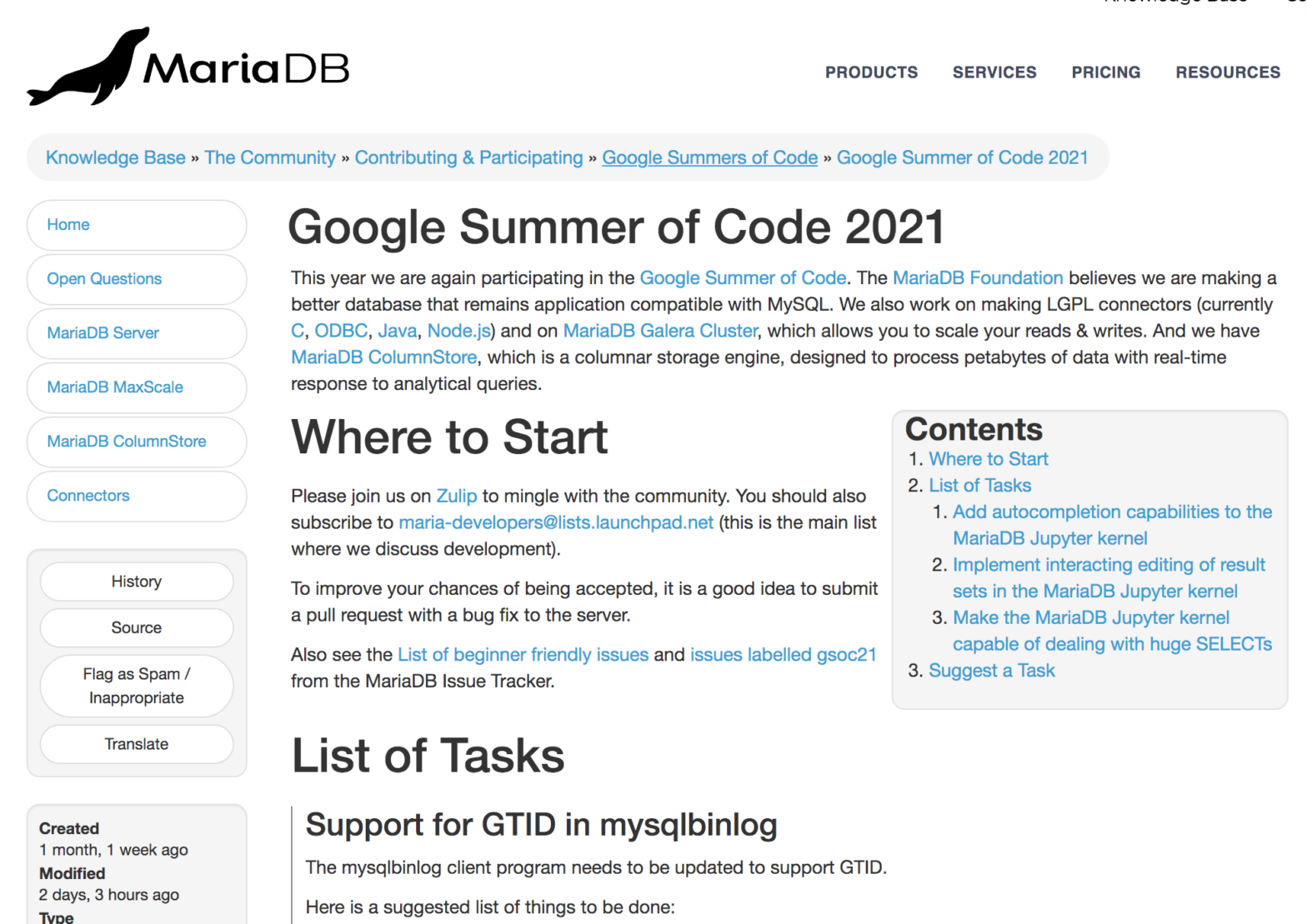Time for another MariaDB Server MiniFest! It will be on Wednesday 9 June 2021, so do mark your calendars. Our topic is the MariaDB in the Cloud. Again, we have a number of high-profile presenters lined up, to present the various cloud solutions for MariaDB. Our goal: to help you better navigate the skies.
Role models: The Server Minifests in Dec 2020, Mar 2021
The Cloud MiniFest follows the format of our Dec 2020 MariaDB Server MiniFest on the Release Policy and the Mar 2021
…
The MariaDB Foundation is pleased to announce the availability of MariaDB 10.6.1, the first beta release in the new MariaDB 10.6 development series.
See the release notes and changelogs for details.
Release Notes Changelog What is MariaDB 10.6?
MariaDB APT and YUM Repository Configuration Generator
Contributors to MariaDB 10.6.1
Aleksey Midenkov (MariaDB Corporation)
Alexander Barkov (MariaDB Corporation)
Alexey Botchkov (MariaDB Corporation)
Alexey Yurchenko (Codership)
Andrei Elkin (MariaDB Corporation)
Brandon Nesterenko (MariaDB Corporation)
Daniel Bartholomew (MariaDB Corporation)
Daniel Black (MariaDB Foundation)
Daniele Sciascia (Codership)
Dmitry Shulga (MariaDB Corporation)
Igor Babaev (MariaDB Corporation)
Jan Lindström (MariaDB Corporation)
Julius Goryavsky (MariaDB Corporation)
Kentoku Shiba (MariaDB Corporation)
Krunal Bauskar (MySQL On ARM)
Mario Karuza (Codership)
Marko Mäkelä (MariaDB Corporation)
Michael Widenius (MariaDB Corporation and MariaDB Foundation)
Nikita Malyavin (MariaDB Corporation)
Oleksandr Byelkin (MariaDB Corporation)
Olivier Bertrand
Otto Kekäläinen
Ramesh Sivaraman (MariaDB Corporation)
Rucha Deodhar (MariaDB Corporation)
Sachin Kumar (MariaDB Corporation)
Sergei Golubchik (MariaDB Corporation)
Sergei Petrunia (MariaDB Corporation)
Sujatha Sivakumar (MariaDB Corporation)
Thirunarayanan Balathandayuthapani (MariaDB Corporation)
Vicențiu Ciorbaru (MariaDB Foundation)
Vladislav Vaintroub (MariaDB Corporation)
31 Contributors
Thanks, and enjoy MariaDB! …
Good news is that the MariaDB Foundation and members of the MariaDB community are participating in Percona Live Online on the 12th – 13th of May, and we are excited to interact with you there. This year there’s a dedicated MariaDB Community track, as well as sessions spread throughout the conference. There’s a diverse range of topics, and a few tutorials to go a little deeper. Here’s a selection of MariaDB-related sessions you can expect at Percona Live Online:
— First Day —
12th May, 06:30 – 07:00 EDT (UTC -4)
Daniel Black – MariaDB Foundation
Logical mariadb-dump –system migration
12th May, 11:00 – 12:00 EDT (UTC -4)
Valerii Kravchuk – MariaDB Corporation
Monitoring and Tracing MySQL or MariaDB Server With Bpftrace
12th May, 13:00 – 13:30 EDT (UTC -4)
Vicentiu Ciorbaru – MariaDB Foundation
What’s new in 10.6
12th May, 13:30 – 14:30 EDT (UTC -4)
Kaj Arnö – MariaDB Foundation
Collaboration in Open Source: A Q&A on GitHub, Jira, Zulip and Knowledge Base
12th May, 14:30 – 15:00 EDT (UTC -4)
Vicentiu Ciorbaru – MariaDB Foundation
JSON additions in MariaDB – featuring JSON_TABLE
12th May, 15:00 – 15:30 EDT (UTC -4)
Anna Widenius – MariaDB Foundation
Virtual work and leadership in the time of pandemics
12th May, 15:30 – 16:00 EDT (UTC -4)
Vicentiu Ciorbaru – MariaDB Foundation
MariaDB ColumnStore – A columnar storage engine, first class citizen in MariaDB
12th May, 16:00 – 17:00 EDT (UTC -4)
Federico Razzoli – Vettabase
Automating MariaDB deployments with Ansible
12th May, 17:00 – 18:00 EDT (UTC -4)
Valerii Kravchuk – MariaDB Corporation
Flame Graphs for MySQL DBAs
— Second Day —
13th May, 07:30 – 08:00 EDT (UTC -4)
Krunal Bauskar – Huawei
Open Source Databases and ARM
13th May, 08:30 – 09:00 EDT (UTC -4)
Pedro Albuquerque – TransferWise
MariaDB High Availability in a Cocktail Mix with Envoy and Orchestrator
13th May, 09:00 – 09:30 EDT (UTC -4)
Robert Bindar – MariaDB Foundation
MariaDB Notebooks in JupyterHub
13th May, 11:30 – 12:00 EDT (UTC -4)
Ian Gilfillan – MariaDB Foundation
When and why to use MariaDB: Key Features in 10.0 to 10.5
13th May, 12:00 – 12:15 EDT (UTC -4)
Kaj Arnö – MariaDB Foundation
Collaboration in Open Source: A Jungle that needs Structure …
MindsDB is an AutoML framework that lets software engineers do machine learning, without having to go through the whole data science pipeline. Additionally, MindsDB has done a seamless integration with MariaDB, by making use of the Connect Storage Engine.
If you want to learn more about how you can do AI straight from inside MariaDB, register for the webinar on 18th of May 16:00 GMT. MariaDB Foundation, together with MindsDB will cover the following topics in detail:
- Why AI inside the database makes sense
- How MariaDB is built to facilitate AI integrations.
…
The MariaDB Foundation is pleased to announce the availability of MariaDB 10.5.10, MariaDB 10.4.19, MariaDB 10.3.29 and MariaDB 10.2.38, the latest stable releases in their respective series.
See the release notes and changelogs for details.
Release Notes Changelog What is MariaDB 10.5?
Release Notes Changelog What is MariaDB 10.4?
Release Notes Changelog What is MariaDB 10.3?
…
Continue reading “MariaDB 10.5.10, 10.4.19, 10.3.29 and 10.2.38 now available”
The MariaDB Foundation is pleased to announce the availability of MariaDB 10.6.0, the first alpha release in the new MariaDB 10.6 development series.
See the release notes and changelogs for details.
Release Notes Changelog What is MariaDB 10.6?
MariaDB APT and YUM Repository Configuration Generator
Contributors to MariaDB 10.6.0
Aleksey Midenkov (MariaDB Corporation)
Alexander Barkov (MariaDB Corporation)
Alexey Botchkov (MariaDB Corporation)
Alexey Bychko (MariaDB Corporation)
Alexey Yurchenko (Codership)
Alice Sherepa (MariaDB Corporation)
Andrei Elkin (MariaDB Corporation)
Anel Husakovic (MariaDB Foundation)
Arnaud Rebillout (Kali Linux)
Bernard Spil (FreeBSD)
CodyBuilder-dev
Daniel Bartholomew (MariaDB Corporation)
Daniel Black (MariaDB Foundation)
Daniele Sciascia (Codership)
David Carlier
Dmitriy Karpovskiy (FRUCT)
Dmitry Shulga (MariaDB Corporation)
Elena Stepanova (MariaDB Corporation)
Etienne Guesnet (Atos)
Eugene Kosov (MariaDB Corporation)
Hartmut Holzgraefe (MariaDB Corporation)
Hollow Man
Ian Gilfillan (MariaDB Foundation)
Igor Babaev (MariaDB Corporation)
Jan Lindström (MariaDB Corporation)
Julius Goryavsky (MariaDB Corporation)
Justin Jagieniak
Karel Picman (Kontron)
Kartik Soneji
Kentoku Shiba (MariaDB Corporation)
Krunal Bauskar (MySQL On ARM)
Lee Keun Won
Mario Karuza (Codership)
Marko Mäkelä (MariaDB Corporation)
Michael Okoko
Michael Widenius (MariaDB Corporation and MariaDB Foundation)
Nayuta Yanagisawa
Oleksandr Byelkin (MariaDB Corporation)
Otto Kekäläinen
Rainer Orth
Rinat Ibragimov (Tempesta)
Robert Bindar (MariaDB Foundation)
Roman Nozdrin (MariaDB Corporation)
Rucha Deodhar (MariaDB Corporation)
Sachin Setiya (MariaDB Corporation)
Seppo Jaakola (Codership)
Sergei Golubchik (MariaDB Corporation)
Sergei Petrunia (MariaDB Corporation)
Sergey Zolotarev
Srinidhi Kaushik
Stepan Patryshev (MariaDB Corporation)
Sujatha Sivakumar (MariaDB Corporation)
Thirunarayanan Balathandayuthapani (MariaDB Corporation)
Varun Gupta (MariaDB Corporation)
Vicențiu Ciorbaru (MariaDB Foundation)
Vladislav Vaintroub (MariaDB Corporation)
Vlad Lesin
xzhangxian1008
zhaorenhai
59 Contributors
Thanks, and enjoy MariaDB! …
Our second poll aims to get to know you better by learning which version of MariaDB Server you primarily use in production. This helps us shift our priorities according to your needs and establish goals that align better with the popularity of the versions.
If you are curious about our previous polls, visit this link here.
…
Continue reading “Poll: Which MariaDB Server version do you mainly run in production?”
Good news, for you and for us: We have been approved for this year’s edition of Google Summer of Code!
What is Google Summer of Code?
Quoting https://en.wikipedia.org/wiki/Google_Summer_of_Code:
The Google Summer of Code, often abbreviated to GSoC, is an international annual program in which Google awards stipends to students who successfully complete a free and open-source software coding project during the summer. The program is open to university students aged 18 or over. It was first held from May to August 2005.
…


